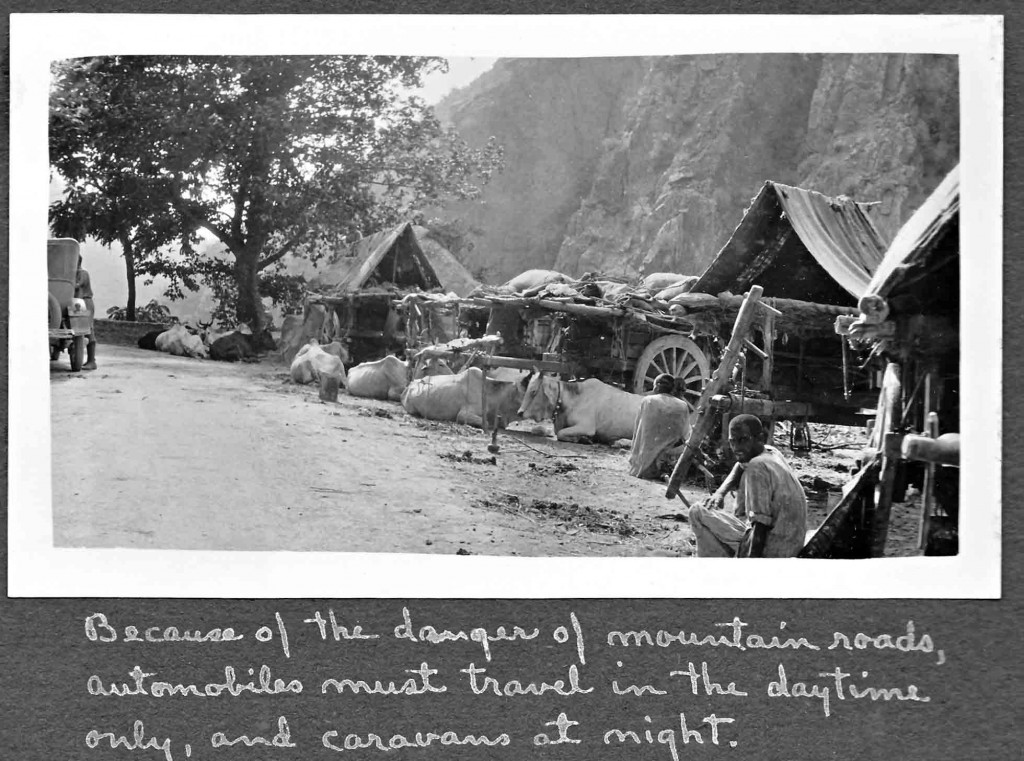Monday, June 10, 1929
Frank got us up at six by pouring cold water on us. After breakfast we completed the packing and discouraged Abdulla’s many bright baksheesh ideas by which he was going to collect a couple more rupees over the 35 we gave them the evening before.
The post office red tape is terrible and it took us an hour and a half to get the four boxes off. I received a letter and telegram from Cook’s saying they had already sent the money wired for, mistaking what I meant. I suppose that means there is no money in Delhi and I shall have to blow $3 or $2.50 more to wire home again.
Frank went down to the First Bridge and got a private car for our trip to Pindi. The price was the same as it would have been in a motor lorry, Rs. 5 including toll tax of Rs 3. Not bad for a 196-mile ride over the mountains.
We left shortly after noon in an old Willys and were soon rolling along the good poplar-tree highway. In many spots these trees are growing only three feet apart, forming a pretty good wall on either side of the road.
Baramula, 32 miles, lay nestled in the folds of the mountains, on the edge off “Happy Valley.” Following the Jehlum River Valley, we dove into the thick of beautiful green mountains, many of which were terraced and cultivated—at least as far up as the acclivity of the hill permitted. These great hills rose one above the other till it seemed you surely must see the snowy peaks, but there were none, just these towering hills with a thin matting of green to hide the living rock, and forests of trees. The geological formations were interesting for the bare cliffs showed the rocks to be warped and twisted into folds and sharp angles, vertical, horizontal, and what not.
All afternoon we followed the Jehlum River, never very far above it, turning and twisting with the road. At far intervals there would be tiny villages with showed evidences of taking advantage of being on the bus route. In each were many tea stands and fruit stalls. By 7:30PM we had covered some 130 miles and at dark stopped before the fine Dak Bungalow in the village of Barsala. The cheapest room we could get was 18¢ per each. This was far too much for our depleted financial condition, so we did what was better for us—Frank and Mort rented a cot and slept in the road alongside the car, while I slept in the luxuriously soft rear seat.
 All night long caravans of heavily-laden ox carts streamed by—though we weren’t awake to know it. Only fast traffic, autos and horses, can travel during the day, and only slow, oxen, can travel after dark. We had passed any number of these carts drawn up in camps by the roadside, the occupants sleeping or going about their chores, waiting for nightfall when they could again move on their way.
All night long caravans of heavily-laden ox carts streamed by—though we weren’t awake to know it. Only fast traffic, autos and horses, can travel during the day, and only slow, oxen, can travel after dark. We had passed any number of these carts drawn up in camps by the roadside, the occupants sleeping or going about their chores, waiting for nightfall when they could again move on their way.
Our chauffeur was a chary driver and very pleasant. The main trouble we had with the car, which had a gas line that was forever getting clogged. When our blankets were sufficiently dusty it began to rain. These showers cooled things off in great shape and especially when we had to push our chariot to get it started. Luckily it was mostly downhill, dropping for the mile level of Kashmir Valley to the 2,000 feet of Barsala.
The Hindu Maharajah must coin money from his road toll taxes. There are some four or five to pass through and each with its red tape, not so bad for a car as a motor lorry. Large buses pay a tax of Rs 25, smaller buses Rs 15, and ordinary cars Rs 9. But I must say he keeps his roads in top notch conditions. The gas, our driver told us, amounted to 25 gallons round trip, 392 miles, drivers pay Rs 4 per day, toll tax Rs 18 round trip, and so the bus company couldn’t possibly make much money. In fact, I don’t see how they make any for their is plenty of competition between the several lines and the rates are so low—for instance, after paying the tax, they have left, in the case of motor lorries, 74¢ for depreciation, gas, profit, etc. The limit is 13 passengers. They make a little on freight. At this time of the year there is a great influx of tourists to Kashmir, especially from Rawal Pindi. On the other hand, there are but few going in the opposite direction. They have to return the cars to Pindi some way, and thus are fortunate to get even a part of expenses paid back. They lost money on us, but will try to make it up on the return trip by charging 130 rupees for four persons.
